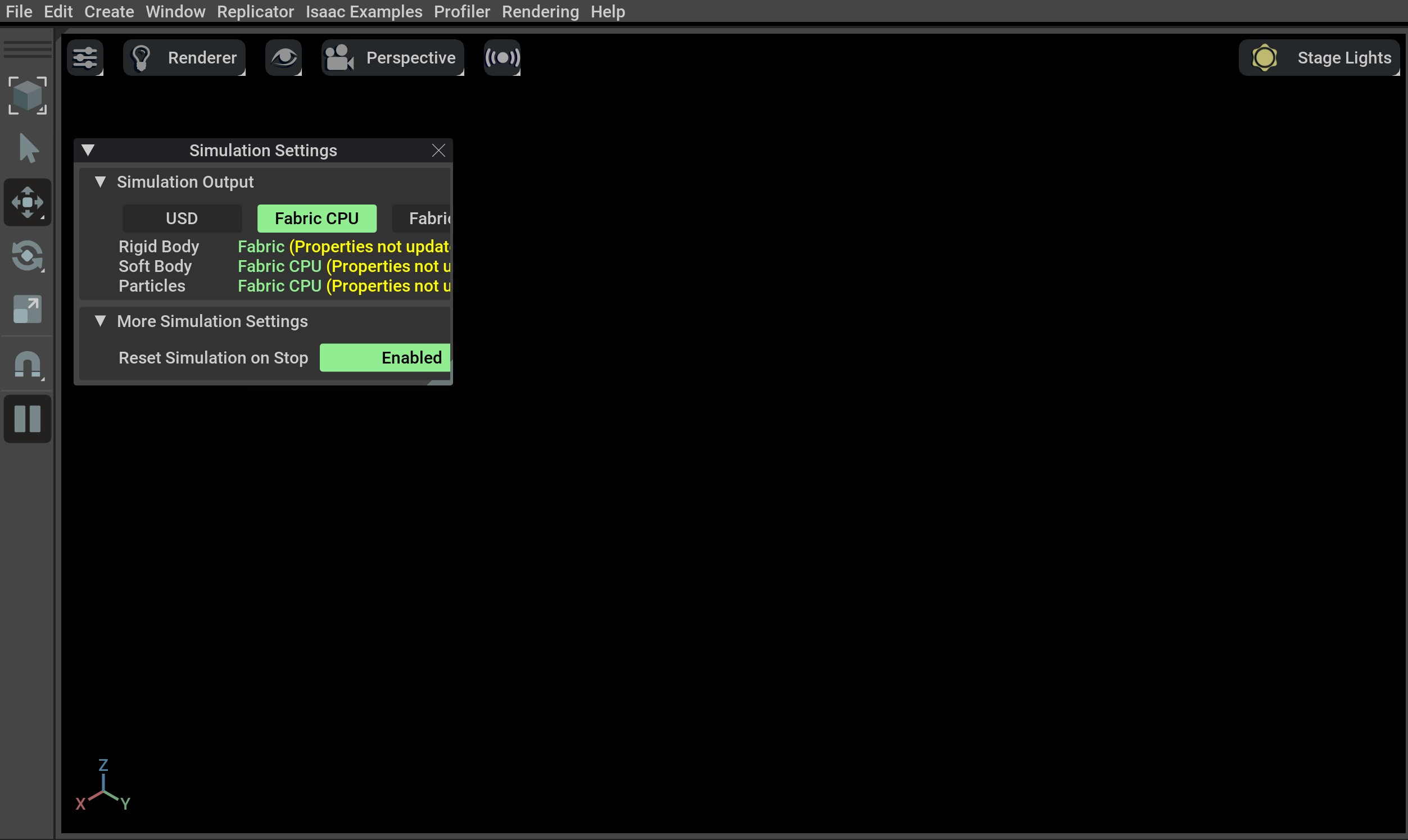Installation using Isaac Sim Pip Package#
The following steps first installs Isaac Sim from pip, then Isaac Lab from source code.
Attention
Installing Isaac Sim with pip requires GLIBC 2.35+ version compatibility.
To check the GLIBC version on your system, use command ldd --version.
This may pose compatibility issues with some Linux distributions. For instance, Ubuntu 20.04 LTS has GLIBC 2.31 by default. If you encounter compatibility issues, we recommend following the Isaac Sim Binaries Installation approach.
Note
If you plan to Set up Visual Studio Code later, we recommend following the Isaac Sim Binaries Installation approach.
Installing Isaac Sim#
From Isaac Sim 4.0 onwards, it is possible to install Isaac Sim using pip. This approach makes it easier to install Isaac Sim without requiring to download the Isaac Sim binaries. If you encounter any issues, please report them to the Isaac Sim Forums.
Attention
On Windows, it may be necessary to enable long path support to avoid installation errors due to OS limitations.
Preparing a Python Environment#
Creating a dedicated Python environment is strongly recommended. It helps:
Avoid conflicts with system Python or other projects installed on your machine.
Keep dependencies isolated, so that package upgrades or experiments in other projects do not break Isaac Sim.
Easily manage multiple environments for setups with different versions of dependencies.
Simplify reproducibility — the environment contains only the packages needed for the current project, making it easier to share setups with colleagues or run on different machines.
You can choose different package managers to create a virtual environment.
UV: A modern, fast, and secure package manager for Python.
Conda: A cross-platform, language-agnostic package manager for Python.
venv: The standard library for creating virtual environments in Python.
Caution
The Python version of the virtual environment must match the Python version of Isaac Sim.
For Isaac Sim 5.X, the required Python version is 3.11.
For Isaac Sim 4.X, the required Python version is 3.10.
Using a different Python version will result in errors when running Isaac Lab.
The following instructions are for Isaac Sim 5.X, which requires Python 3.11. If you wish to install Isaac Sim 4.5, please use modify the instructions accordingly to use Python 3.10.
Create a virtual environment using one of the package managers:
To install conda, please follow the instructions here. You can create the Isaac Lab environment using the following commands.
We recommend using Miniconda, since it is light-weight and resource-efficient environment management system.
conda create -n env_isaaclab python=3.11 conda activate env_isaaclab
To create a virtual environment using the standard library, you can use the following commands:
# create a virtual environment named env_isaaclab with python3.11 python3.11 -m venv env_isaaclab # activate the virtual environment source env_isaaclab/bin/activate
:: create a virtual environment named env_isaaclab with python3.11 python3.11 -m venv env_isaaclab :: activate the virtual environment env_isaaclab\Scripts\activate
To install
uv, please follow the instructions here.Note
A virtual environment created by
uv venvdoes not includepip. Since Isaac Lab installation requirespip, please install it manually after activating the environment.You can create the Isaac Lab environment using the following commands:
# create a virtual environment named env_isaaclab with python3.11 and pip uv venv --python 3.11 --seed env_isaaclab # activate the virtual environment source env_isaaclab/bin/activate
:: create a virtual environment named env_isaaclab with python3.11 and pip uv venv --python 3.11 --seed env_isaaclab :: activate the virtual environment env_isaaclab\Scripts\activate
Ensure the latest pip version is installed. To update pip, run the following command from inside the virtual environment:
pip install --upgrade pip
python -m pip install --upgrade pip
Installing dependencies#
Note
In case you used UV to create your virtual environment, please replace pip with uv pip
in the following commands.
Install Isaac Sim pip packages:
pip install "isaacsim[all,extscache]==5.1.0" --extra-index-url https://pypi.nvidia.com
Install a CUDA-enabled PyTorch build that matches your system architecture:
pip install -U torch==2.7.0 torchvision==0.22.0 --index-url https://download.pytorch.org/whl/cu128
pip install -U torch==2.7.0 torchvision==0.22.0 --index-url https://download.pytorch.org/whl/cu128
pip install -U torch==2.9.0 torchvision==0.24.0 --index-url https://download.pytorch.org/whl/cu130
Note
After installing Isaac Lab on aarch64, you may encounter warnings such as:
ERROR: ld.so: object '...torch.libs/libgomp-XXXX.so.1.0.0' cannot be preloaded: ignored.
This occurs when both the system and PyTorch
libgomp(GNU OpenMP) libraries are preloaded. Isaac Sim expects the system OpenMP runtime, while PyTorch sometimes bundles its own.To fix this, unset any existing
LD_PRELOADand set it to use the system library only:unset LD_PRELOAD export LD_PRELOAD="$LD_PRELOAD:/lib/aarch64-linux-gnu/libgomp.so.1"
This ensures the correct
libgomplibrary is preloaded for both Isaac Sim and Isaac Lab, removing the preload warnings during runtime.
Verifying the Isaac Sim installation#
Make sure that your virtual environment is activated (if applicable)
Check that the simulator runs as expected:
# note: you can pass the argument "--help" to see all arguments possible. isaacsimIt’s also possible to run with a specific experience file, run:
# experience files can be absolute path, or relative path searched in isaacsim/apps or omni/apps isaacsim isaacsim.exp.full.kit
Note
When running Isaac Sim for the first time, all dependent extensions will be pulled from the registry. This process can take upwards of 10 minutes and is required on the first run of each experience file. Once the extensions are pulled, consecutive runs using the same experience file will use the cached extensions.
Attention
The first run will prompt users to accept the Nvidia Omniverse License Agreement.
To accept the EULA, reply Yes when prompted with the below message:
By installing or using Isaac Sim, I agree to the terms of NVIDIA OMNIVERSE LICENSE AGREEMENT (EULA)
in https://docs.isaacsim.omniverse.nvidia.com/latest/common/NVIDIA_Omniverse_License_Agreement.html
Do you accept the EULA? (Yes/No): Yes
If the simulator does not run or crashes while following the above instructions, it means that something is incorrectly configured. To debug and troubleshoot, please check Isaac Sim documentation and the Isaac Sim Forums.
Installing Isaac Lab#
Cloning Isaac Lab#
Note
We recommend making a fork of the Isaac Lab repository to contribute
to the project but this is not mandatory to use the framework. If you
make a fork, please replace isaac-sim with your username
in the following instructions.
Clone the Isaac Lab repository into your project’s workspace:
git clone git@github.com:isaac-sim/IsaacLab.git
git clone https://github.com/isaac-sim/IsaacLab.git
We provide a helper executable isaaclab.sh and isaaclab.bat for Linux and Windows respectively that provides utilities to manage extensions.
./isaaclab.sh --help
usage: isaaclab.sh [-h] [-i] [-f] [-p] [-s] [-t] [-o] [-v] [-d] [-n] [-c] -- Utility to manage Isaac Lab.
optional arguments:
-h, --help Display the help content.
-i, --install [LIB] Install the extensions inside Isaac Lab and learning frameworks (rl_games, rsl_rl, sb3, skrl) as extra dependencies. Default is 'all'.
-f, --format Run pre-commit to format the code and check lints.
-p, --python Run the python executable provided by Isaac Sim or virtual environment (if active).
-s, --sim Run the simulator executable (isaac-sim.sh) provided by Isaac Sim.
-t, --test Run all python pytest tests.
-o, --docker Run the docker container helper script (docker/container.sh).
-v, --vscode Generate the VSCode settings file from template.
-d, --docs Build the documentation from source using sphinx.
-n, --new Create a new external project or internal task from template.
-c, --conda [NAME] Create the conda environment for Isaac Lab. Default name is 'env_isaaclab'.
-u, --uv [NAME] Create the uv environment for Isaac Lab. Default name is 'env_isaaclab'.
isaaclab.bat --help
usage: isaaclab.bat [-h] [-i] [-f] [-p] [-s] [-v] [-d] [-n] [-c] -- Utility to manage Isaac Lab.
optional arguments:
-h, --help Display the help content.
-i, --install [LIB] Install the extensions inside Isaac Lab and learning frameworks (rl_games, rsl_rl, sb3, skrl) as extra dependencies. Default is 'all'.
-f, --format Run pre-commit to format the code and check lints.
-p, --python Run the python executable provided by Isaac Sim or virtual environment (if active).
-s, --sim Run the simulator executable (isaac-sim.bat) provided by Isaac Sim.
-t, --test Run all python pytest tests.
-v, --vscode Generate the VSCode settings file from template.
-d, --docs Build the documentation from source using sphinx.
-n, --new Create a new external project or internal task from template.
-c, --conda [NAME] Create the conda environment for Isaac Lab. Default name is 'env_isaaclab'.
-u, --uv [NAME] Create the uv environment for Isaac Lab. Default name is 'env_isaaclab'.
Installation#
Install dependencies using
apt(on Linux only):# these dependency are needed by robomimic which is not available on Windows sudo apt install cmake build-essential
Run the install command that iterates over all the extensions in
sourcedirectory and installs them using pip (with--editableflag):./isaaclab.sh --install # or "./isaaclab.sh -i"
isaaclab.bat --install :: or "isaaclab.bat -i"By default, the above will install all the learning frameworks. These include
rl_games,rsl_rl,sb3,skrl,robomimic.If you want to install only a specific framework, you can pass the name of the framework as an argument. For example, to install only the
rl_gamesframework, you can run:./isaaclab.sh --install rl_games # or "./isaaclab.sh -i rl_games"
isaaclab.bat --install rl_games :: or "isaaclab.bat -i rl_games"The valid options are
all,rl_games,rsl_rl,sb3,skrl,robomimic, andnone. Ifnoneis passed, then no learning frameworks will be installed.
Verifying the Isaac Lab installation#
To verify that the installation was successful, run the following command from the top of the repository:
# Option 1: Using the isaaclab.sh executable
# note: this works for both the bundled python and the virtual environment
./isaaclab.sh -p scripts/tutorials/00_sim/create_empty.py
# Option 2: Using python in your virtual environment
python scripts/tutorials/00_sim/create_empty.py
:: Option 1: Using the isaaclab.bat executable
:: note: this works for both the bundled python and the virtual environment
isaaclab.bat -p scripts\tutorials\00_sim\create_empty.py
:: Option 2: Using python in your virtual environment
python scripts\tutorials\00_sim\create_empty.py
The above command should launch the simulator and display a window with a black
viewport. You can exit the script by pressing Ctrl+C on your terminal.
On Windows machines, please terminate the process from Command Prompt using
Ctrl+Break or Ctrl+fn+B.

If you see this, then the installation was successful! 🎉
Note
If you see an error ModuleNotFoundError: No module named 'isaacsim', please ensure that the virtual
environment is activated and source _isaac_sim/setup_conda_env.sh has been executed (for uv as well).
Train a robot!#
You can now use Isaac Lab to train a robot through Reinforcement Learning! The quickest way to use Isaac Lab is through the predefined workflows using one of our Batteries-included robot tasks. Execute the following command to quickly train an ant to walk!
We recommend adding --headless for faster training.
./isaaclab.sh -p scripts/reinforcement_learning/rsl_rl/train.py --task=Isaac-Ant-v0 --headless
isaaclab.bat -p scripts/reinforcement_learning/rsl_rl/train.py --task=Isaac-Ant-v0 --headless
… Or a robot dog!
./isaaclab.sh -p scripts/reinforcement_learning/rsl_rl/train.py --task=Isaac-Velocity-Rough-Anymal-C-v0 --headless
isaaclab.bat -p scripts/reinforcement_learning/rsl_rl/train.py --task=Isaac-Velocity-Rough-Anymal-C-v0 --headless
Isaac Lab provides the tools you’ll need to create your own Tasks and Workflows for whatever your project needs may be. Take a look at our How-to Guides guides like Adding your own learning Library or Wrapping Environments for details.


